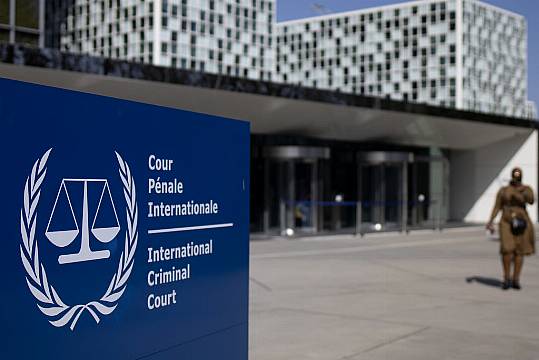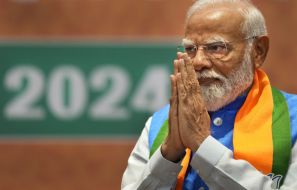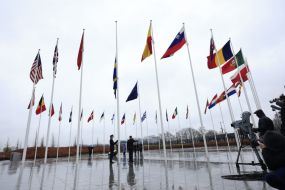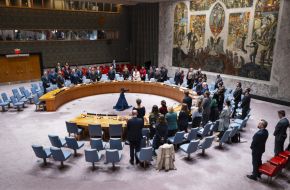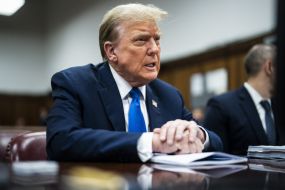The International Criminal Court’s prosecutor has launched an investigation that could target senior officials believed to be responsible for war crimes, crimes against humanity or genocide amid a rising civilian death toll and widespread destruction of property during Russia’s invasion of Ukraine.
Karim Khan announced the probe late on Wednesday night after dozens of the court’s member states asked him to take action.
“An investigation by the International Criminal Court into Russia’s barbaric acts is urgently needed and it is right that those responsible are held to account,” British Foreign Secretary Liz Truss said. “The UK will work closely with allies to ensure justice is done.”
After informing the court’s judges of his decision to open an investigation that covers all sides in the conflict, Mr Khan said: “Our work in the collection of evidence has now commenced.”
📢 Statement of #ICC Prosecutor #KarimAAKhanQC on the Situation in #Ukraine: Receipt of Referrals from 39
States Parties and the Opening of an Investigation. Read more ⤵️ https://t.co/drXHZxALNxAdvertisement— Int'l Criminal Court (@IntlCrimCourt) March 2, 2022
Ukraine’s State Emergency Service has said that more than 2,000 civilians have died since the Russian invasion, a claim that was impossible to verify.
There have also been reports of the use by Russian troops of cluster bombs, with a nursery school and a hospital both reportedly hit.
President Vladimir Putin’s “military machine is targeting civilians indiscriminately and tearing through towns across Ukraine”, Ms Truss said.
On Thursday, rights groups welcomed the nations’ request for an investigation.
Balkees Jarrah, interim international justice director at Human Rights Watch, said: “The request for an ICC investigation reflects the growing alarm among countries about the escalating atrocities and human rights crisis that has gripped Ukraine.
“These governments are making clear that serious crimes will not be tolerated and that the court has an essential role to play in ensuring justice.”
The ICC's swift action in Ukraine is:
1) Important; and
2) Painful for Afghans to see, as they have been waiting for ICC action in Afghanistan since (checks notes) 2007, when the ICC's preliminary examination there was made public. https://t.co/YmPRmMtT9h https://t.co/ZesG3XPzbP— Heather Barr (@heatherbarr1) March 3, 2022
Advertisement
The court has already carried out a preliminary inquiry into crimes linked to the violent suppression of pro-European protests in Kyiv in 2013-2014 by a pro-Russia Ukrainian administration and allegations of crimes in the Crimean Peninsula, which Russia annexed in 2014, and eastern Ukraine, where Moscow has backed rebels since 2014.
It found “a broad range of conduct constituting war crimes and crimes against humanity within the jurisdiction of the court have been committed” in Ukraine, Mr Khan’s predecessor, Fatou Bensouda, said at the time.
Those findings will also be included in Mr Khan’s investigation.
Mr Putin and his military top brass could potentially face charges for ordering attacks that breach the laws of war, said Marieke de Hoon, assistant professor of international criminal law at the University of Amsterdam.
“The ICC is created to circumvent Putin’s head of state immunity in foreign courts,” she said. “The ICC can now continue its investigation, open cases and issue arrest warrants.”
But she also noted that the ICC can only put a suspect on trial in The Hague if they are arrested.
The court does not have a police force to detain suspects and relies on international co-operation to enforce its arrest warrants. Under ICC rules, suspects cannot be tried in their absence.
How armies are allowed to act during military conflicts is governed by what is known as international humanitarian law, the aim of which is to protect civilians and rein in the use of force.
“That means that a certain category of people – so-called combatants, who distinguish themselves from civilians and are engaged in the armed conflict – can use force but only against military targets and then only when those are necessary, and only with proportional means,” said Dr De Hoon.
To be classed as crimes against humanity, attacks have to be part of what the ICC’s founding treaty, the Rome Statute, calls “a widespread or systematic attack directed against any civilian population”.
The use of munitions such as cluster bombs is also likely, if confirmed, to qualify as a war crime because of their indiscriminate nature.
“It’s impossible with those types of weapons to distinguish between military targets and civilians,” Dr De Hoon said.
While Mr Khan has now opened an investigation, he is unlikely to be able to send investigators into Ukraine to collect evidence and speak to witnesses while war is still raging.
“It is hard to investigate on the ground now,” Dr De Hoon said. “But there are a lot of open source investigations possible, using for instance satellite images and social media posts. Other states can also share the evidence they collect with the ICC.”
The ICC was set up in 2002 to prosecute war crimes, crimes against humanity and genocide. The crime of aggression, which cannot be investigated in Ukraine because neither Russia nor Ukraine is a member of the court, was added later.
The ICC is a court of last resort, taking on cases when national authorities are unwilling or unable to prosecute.
Over the past 20 years, its prosecutors have filed charges against military and government leaders in several countries, but it has not managed to bring many to justice.
One of the first suspects charged by the court was Joseph Kony, a Ugandan warlord who leads the cult-like Lord’s Resistance Army rebel group. An international arrest warrant was issued in 2005 but he remains at large.
Another high-profile fugitive is ousted Sudanese leader Omar al-Bashir, who still has not been handed to the ICC despite arrest warrants dating back to 2009 and 2010 for allegedly ordering atrocities in the Darfur region.
As Mr Khan launched the court’s latest investigation, he put combatants and their leaders on notice that he is watching them.
“With an active investigation now under way, I repeat my call to all those engaged in hostilities in Ukraine to adhere strictly to the applicable rules of international humanitarian law,” he said.
“No individual in the Ukraine situation has a licence to commit crimes within the jurisdiction of the International Criminal Court.”
